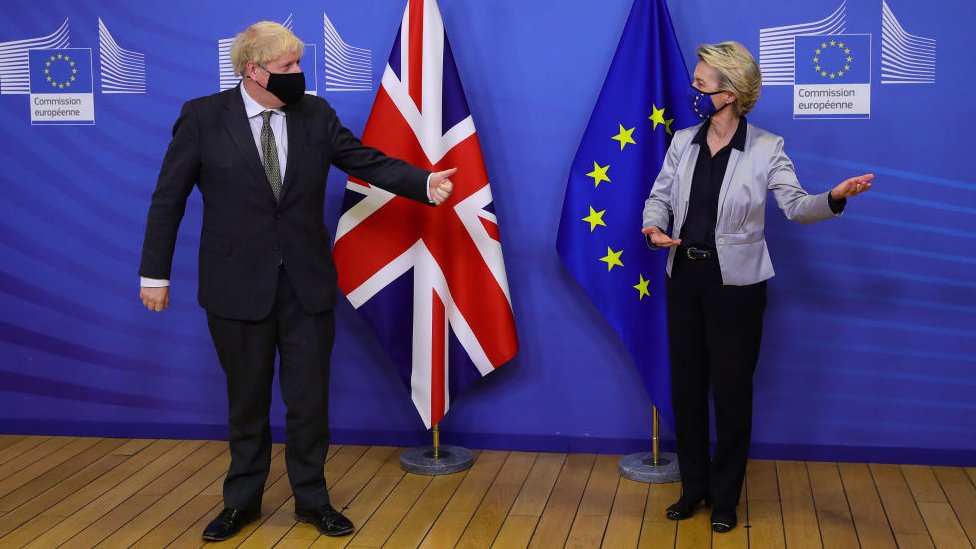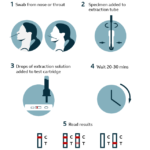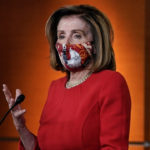Brexit: EU offer ‘unacceptable’ as trade talks continue – BBC News

Getty Images
Post-Brexit trade talks have entered their final day with negotiations continuing into the night in a last-ditch effort to make a breakthrough.
Both sides have warned they are unlikely to reach an agreement.
The terms offered by the European Union continue to be “unacceptable” to the UK, according to a government source.
Boris Johnson is expected to speak with European Commission President Ursula von der Leyen later – they agreed on the Sunday deadline earlier this week.
The source said: “The prime minister will leave no stone unturned in this process, but he is absolutely clear: any agreement must be fair and respect the fundamental position that the UK will be a sovereign nation in three weeks’ time.”
-
What are the sticking points in Brexit trade talks?
- What are the UK and EU doing to prepare for no deal?
- What happens if there’s no trade deal?
The main sticking point in the talks is how close the UK should stick to EU economic rules in the future.
The EU is determined to prevent the UK from gaining what it sees as an unfair advantage of having tariff-free access to its markets, while setting its own standards on products, employment rights and business subsidies.
Fishing rights is another major area of disagreement, with the EU warning that without access to UK waters for EU fleets, UK fishermen will no longer get special access to EU markets to sell their goods.
But the UK argues that what goes on in its own waters, and its wider business rules, should be under its control as a sovereign country.
The government confirmed on Saturday that no-deal preparations had seen Royal Navy vessels prepared to tackle “threats of illegal fishing” in UK waters.
Outlining the steps taken to prepare for all Brexit eventualities, a UK government spokesman said: “We’ve run live exercises moving fresh produce and fish across the border, and scrambled naval vessels to respond to threats of illegal fishing in our soon-to-be sovereign waters.”
The two sides also disagree on whether the European Court of Justice should settle future UK-EU trade disputes.
It is not clear how any decision to abandon the talks will be made public and there is a chance political leaders will decide to continue negotiations beyond Sunday, BBC Europe correspondent Kevin Connolly said.

The basics
- Brexit happened but rules didn’t change at once: The UK left the European Union on 31 January 2020, but leaders needed time to negotiate a deal for life afterwards – they got 11 months.
- Talks are happening: The UK and the EU have until 31 December 2020 to agree a trade deal as well as other things, such as fishing rights.
- If there is no deal: Border checks and taxes will be introduced for goods travelling between the UK and the EU. But deal or no deal, we will still see changes.
What happens next with Brexit?

Meanwhile, the National Farmers’ Union have warned there will be “significant disruption” to the sector if the UK fails to reach a trade deal with the EU.
The EU is the largest trading partner for British farmers – but without a deal by the end of the Brexit transition period on 31 December, farmers could lose free access to the bloc “overnight”, the union said.
Elsewhere, Labour warned that staffing levels in the government’s tax and customs agency had barely been scaled up since the Brexit vote, despite widespread customs changes expected even if the UK is able to secure a deal.
The party said its analysis suggested the number of UK customs officials had been boosted by just 16, despite a pledge from ministers in 2018 to recruit between 3,000 and 5,000 extra officials.
This weekend’s deadline was set by Mr Johnson and Mrs von der Leyen following a meeting in Brussels on Wednesday, after months of talks failed to achieve an agreement.
Mr Johnson said the EU needed to make a “big change” over the main sticking points on fishing rights and business competition rules, while Mrs von der Leyen said no deal was the most probable end to “difficult” talks.
The EU has rejected Mr Johnson’s request to bypass the European Commission and speak directly to French President Emmanuel Macron and Germany’s Angela Merkel about the unresolved issues.
According to EU officials, he was told discussions could only take place through the bloc’s chief negotiator, Michel Barnier.
Speaking on Friday, the PM said a no-deal Brexit was now “very, very likely” and that planning for that outcome was ramping up.
Mrs von der Leyen told reporters that the two sides were still “apart on fundamental issues”.

- SIMPLE GUIDE: What happens next with Brexit?
- TRAVEL RULES: How your holidays will change in 2021
- NO DEAL: What happens if these talks fail?
- BREXIT: Seven things that will change on 1 January

Published at Sun, 13 Dec 2020 01:19:00 +0000





Comments
Loading…